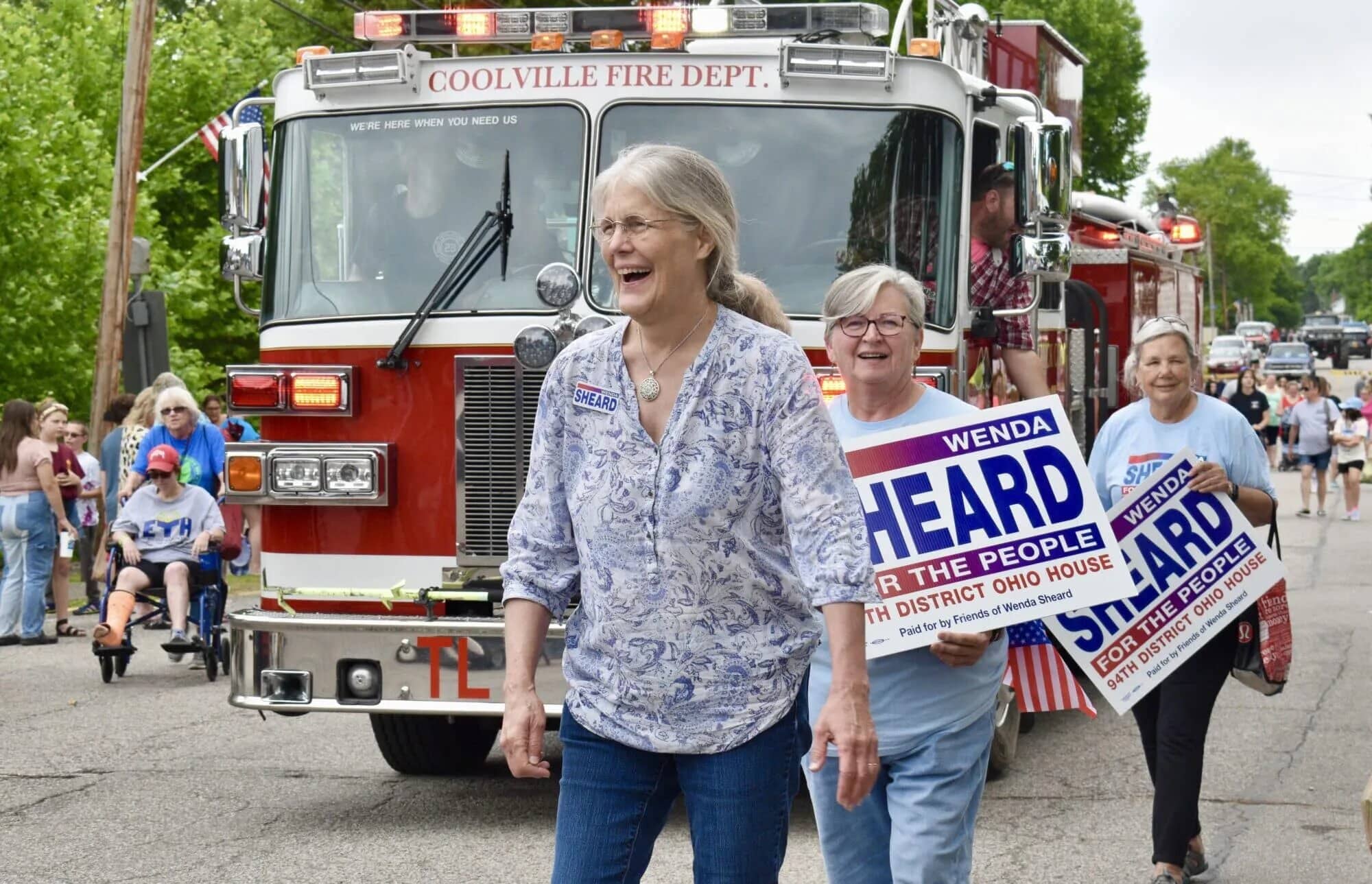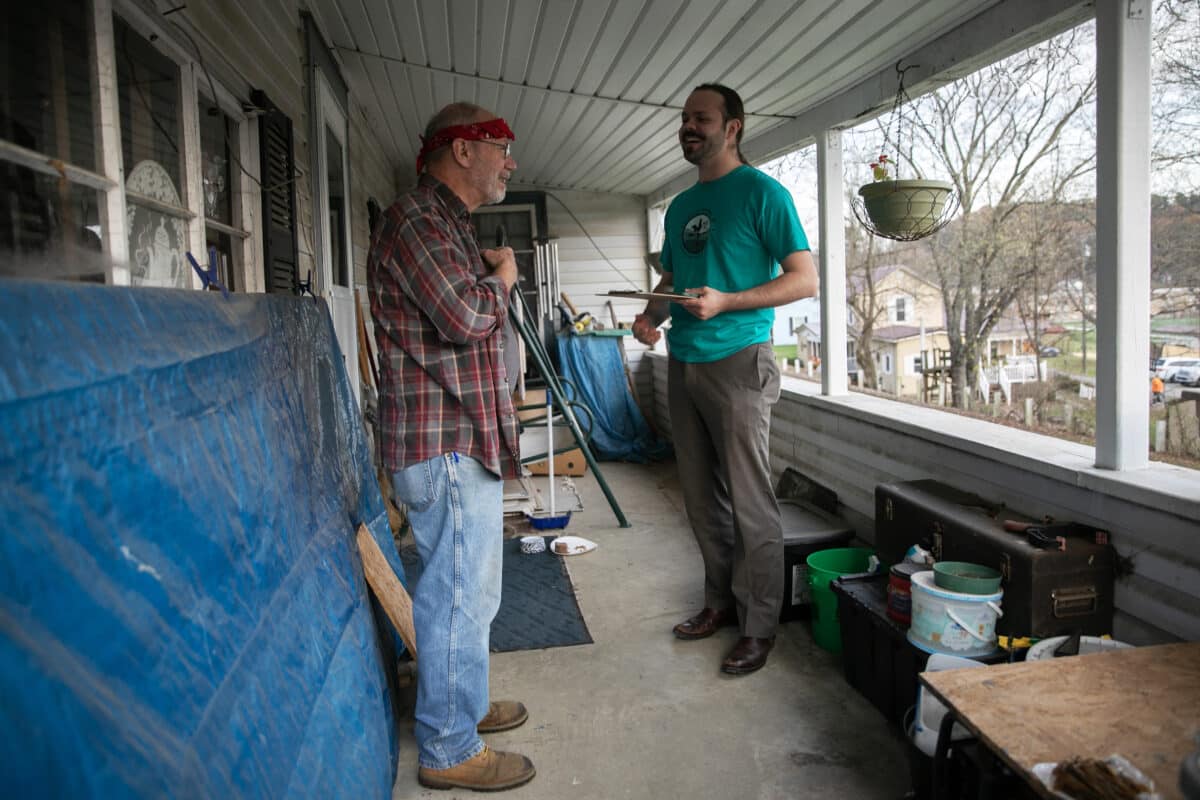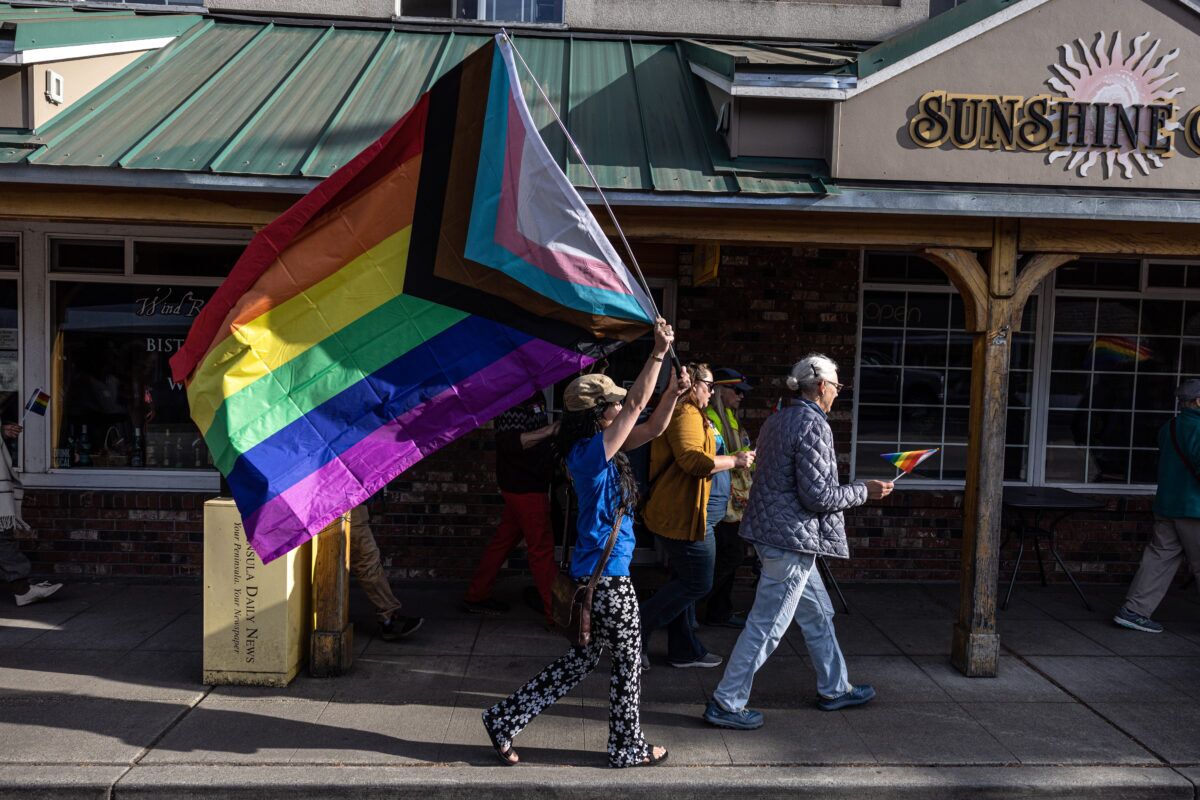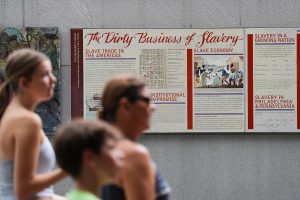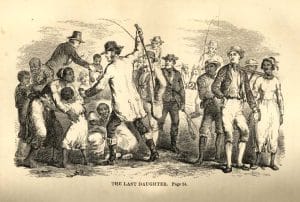This story was originally published by Barn Raiser, your independent source for rural and small town news.
Wenda Sheard became a candidate for public office not because she thought she’d win, but because nobody else was willing to run.
The self-described grandma, attorney, former teacher and trained mediator is running for state representative as a Democrat in a rural district near Athens, Ohio. She’s running for an open seat after her representative, Jay Edwards, a Republican, reached his term limit. The district’s partisan tilt—Edwards regularly won by a 60/40 split—scared potential Democratic challengers away. After a trip to Guatemala during which she saw widespread protests against the government’s efforts to overturn the presidential election there, Sheard came back fired up and filed to run for office the Friday before the state deadline in December.
“We have to contest every race,” Sheard says. “Otherwise, instead of elections, we have coronations.”
Sheard is one of a growing number of progressives across the United States whose work is supported by a network of political groups targeting small towns and rural communities. These organizations vary in their structure and tactics, but they all intend to generate enthusiasm and spur engagement from political progressives in areas the Democratic Party given up on since 2000.
Many of these rural places were once an important part of Democrats’ coalition, but they’ve trended Republican over the last generation. That trend was accelerated by a GOP push to fund candidates in state house races ahead of the 2010 Census and midterm elections, which allowed states to redraw district lines for state and federal elections for the next decade. Republicans that year took control of 29 state governorships (a net loss of six for Democrats) and gained more than 690 seats in state legislatures—the largest gain for Republicans since 1928. Such wins allowed the GOP to control redistricting in 17 states.
Meanwhile, Democrats debated how much emphasis to place on rural America. Howard Dean, then-chairman of the Democratic National Committee, argued for a “50-state strategy” to bolster the party’s support in areas where it was losing races. Dean clashed with Senate and House campaign committee heads Chuck Schumer and Rahm Emanuel, who wanted to focus on swing districts. Schumer and Emanuel ultimately won out as Democrats saw more success winning suburban areas, and the Party placed less effort into winning more sparsely populated regions.
READ: Would Compulsory Voting Strengthen Democracy in the United States?
That began to change again after the 2016 election, when Donald Trump spiked GOP margins in rural America. In the aftermath, a slate of left-leaning organizations formed to organize rural communities through a variety of tactics.
According to Matthew Hildreth, the founder of Rural Organizing, and current rural vote director for the Harris-Walz campaign, the push to organize rural Democrats began years earlier, during the lead-up to Barack Obama’s 2012 reelection campaign. Hildreth grew up in South Dakota, got into advocacy and politics in 2007, and moved to Iowa in 2011. Hildreth had seen the Obama campaign run a sophisticated rural operation that was built from its 2008 push to win the Iowa Caucuses.
However, the Obama campaign is better remembered for its sophisticated approach to voter contacts. And folks drew the wrong lessons, Hildreth says.
“The problem is we’ve become over-obsessed with predictive analytics,” Hildreth says. “By 2012, digital took over all of our campaigns and told us they know this house will be Democratic, this one Republican. If you live in Raleigh-Durham and move out to a more rural area, the voter file will penalize you for moving. The assumption is a person living in rural North Carolina is more conservative than a person in urban North Carolina. That’s what we’re fighting against. There’s a whole group of people who have been made invisible by analytics. That algorithm has cost us more votes than racism.”
In 2012, Hildreth launched a website, RuralOrganizing.org, to connect rural organizers. He saw its contact list swell to more than 600,000 addresses and by 2018 was able to make it a full-time job. Rural Organizing built out multiple operations that included a 501(c)(3) nonprofit, a 501(c)(4) social welfare organization and a super PAC to spend money on elections.
Rural Organizing’s (c)(3) nonprofit is focused on flipping stereotypes about rural areas.
“So much of what happens in small towns is decided in places other than those small towns, whether it’s state capitals or Washington, D.C.,” Hildreth says. “Rural people solve local problems. Rural folks know what their communities need—the solutions to economic decline, population loss, opioids and all the things should come from rural folks.”
The (c)(4) leverages lobbying and grassroots activism to press for rural-centric policies, including the RECOMPETE (Rebuilding Economies and Creating Opportunities for More People to Excel) Act that authorized more federal funding for economically distressed communities. Other priorities include the Child Tax Credit, health care, child care and lowering the cost of living.
Finally, the super PAC has distributed over 62,000 rural-related yard signs across five battleground states ahead of this year’s presidential election, including non-partisan issue-only signs, Harris/Walz signs, and Senate signs to support Democratic incumbents Jon Tester in Montana and Sherrod Brown in Ohio.
In September, Kamala Harris hired Hidreth as her rural engagement director. Campaign officials said his goal is to trim Republican margins in rural areas, which in highly-contested swing states like Arizona, Georgia and Pennsylvania could be enough to tip the state in the 2024 election.
‘We need someone on the ballot everywhere’
Other organizations take a different approach. Contest Every Race recruits candidates in races that otherwise would be uncontested, a feature all too common in rural politics. The group launched in 2018 and has recruited or helped support more than 7,500 down-ballot candidates in 45 states, says executive director Lauren Gepford. Contest Every Race primarily targets candidates at the local level for offices that often prohibit party labels.
“The majority of the candidates we’ve recruited have been in nonpartisan races,” Gepford says. “We start by getting in touch with state and local Democratic parties to get their analysis of which candidates are on the right or wrong side, generally which ones are progressive and they support.”
The group’s working theory is based on the idea of “reverse coattails”—that supporting progressive candidates to contest more county-level, down-ballot races will lead to better margins for Democrats at the top of the ticket.
In recent years, Contest Every Race has turned its attention toward school boards, which have been targeted by conservative activists and so-called “parents’ rights” organizations like Moms for Liberty and Parents Defending Education who want to influence curriculum, restrict books in school libraries and otherwise set school policies. Contest Every Race is also working with candidates for state legislatures across the United States.
“This is the first time I’ve ever run for office,” says Rick Delaney, a Democratic candidate in northwest Arkansas running for the state House of Representatives. “Contest Every Race is what spurred me along. We need someone on the ballot everywhere.”
In Ohio, Victoria Maddox grew increasingly frustrated over increasing costs and the U.S. Supreme Court’s reversal of Roe v. Wade.
“I wondered why our representatives are not doing anything, and then I did some research and realized, ‘Oh, because they’ve been in office for 50 years, and there’s no one running against them,’ ” Maddox says. “If I’m not running, I’m a bit of a hypocrite.”
Contest Every Race also worked with Wenda Sheard, the Ohio State House candidate near Athens.
“I went into the race thinking I’d simply be a name on the ballot,” Sheard says. “Then, I realized people were excited.”
Since entering the campaign in December, Sheard’s been on the go, doing all the things it takes to run a campaign. She knocks on doors, speaks to groups, seeks endorsements, raises money.
Regardless of the outcome, Sheard says, “I’m winning. I am winning because all of my people, everyone who talks about my race and other races — we are providing hope, we are providing a choice, and we are informing voters.”
But she’s also learned some hard lessons about campaigning.
“It’s sad,” Sheard says. “I’ve learned you need money to run, and the people most likely to win are the people who have the rich people supporting them. Most of the people the rich people support are the people continuing making sure they’re rich, who will pass policies that will continue benefits to the wealthy.”
Contest Every Race’s Gepford says that’s a common sentiment.
“We’ve more and more heard, ‘I was excited to run but didn’t receive any support when I was running,’ ” Gepford says.
So far, the group has relied on local and state party committees to fund candidates it helps recruit.
Down-ballot races get a boost up
Although many groups offer support in the form of phone banking, canvassing and other in-kind contributions, most don’t offer direct financial contributions for anything other than hotly contested races in seats considered flippable and those in battleground states.
Determining how much financial support rural candidates have received versus those in metro areas is tricky, both because of the lack of clarity in how rural areas are defined and because of variance in cash contributions and in-kind support. Every State Blue has funded 121 Democratic candidates in statewide races in Missouri, Ohio and Tennessee through mid-October, beginning with those who have the least resources, according to Executive Director Michele Hornish.
One of Every State Blue’s affiliate organizations is Blue Missouri, which concentrates on financially supporting rural candidates regardless of competitiveness.
“Just last Friday I was on phone calls all day long, we gave away $173,000 to 43 down-ballot candidates in Missouri,” says Blue Missouri Executive Director Jess Piper. “We fund the neediest first. We call it the bathtub method: we start from the bottom and fill it up. Because we did that, there’s no Democrat running in any state or state senate race with less than $6,500. It’s a massive shot in the arm to the reddest, the most rural, the most difficult districts in Missouri.”
Piper joined Blue Missouri after her own experience as a candidate in 2022, when she left her job as a teacher to challenge an otherwise uncontested state representative Jeff Farnan. Although Piper lost the election, she raised $275,000. “It made a light click on for me,” she said. “I know money can’t buy a race, but it sure does help a message get out.”
READ: The Christian Right’s Playbook to Elect Donald Trump in November
Today, Blue Missouri has built a network of nearly 900 donors who make monthly donations. The organization holds monthly meetings with candidates and party nominees, and builds them up with campaign contributions—more than $550,000 in Missouri since the organization was founded in 2017.
Importantly, Blue Missouri does not base its contributions on a race’s competitiveness. “The way we do things just flips everything on its head,” Piper says. “We focus on nominees who are in really tough places to get them to run and hopefully build a bench.”
It will take Democrats longer than a single election cycle—much longer in some cases—to start winning back rural districts they’ve ceded for the last decade-plus. Building a bench of candidates and providing them sustained support is a key part of that, Piper argues.
“It’s knocking on doors, it’s having conversations with people who haven’t heard the Democratic message in a decade or better,” Piper says. “The only we get that message out is to have someone on the ground, and the only way we get someone on the ground is to fund them.”
Organizers take their ground game to red states
Rural GroundGame operates mostly in Virginia, where elections are held every year. The organization supports individual candidates as well as helping Democrats maintain a visible presence year-round through billboards, newspaper ads and barn signs.
“We’re in this moment now, for rural organizing in particular, where you have to hold so many things in your hands at once,” says Lynlee Thorne, Rural GroundGame’s political director. “What is it we can reasonably accomplish to be part of larger rural push, to move margins that can ultimately win states?”
For People’s Action rural organizer Kellon Patey, making a difference on the ground requires long-term organizing and campaign plans.
Patey coordinates a network of rural partner organizations across the country, including Iowa CCI (Citizens for Community Improvement), Down Home North Carolina, the Arkansas Public Policy Panel, Pennsylvania United, Pennsylvania Stands Up, VOCAL-KY (Voices of Community Activists and Leaders), Citizen Action of Wisconsin and the Maine People’s Alliance.
Iowa Citizens for Community Improvement (CCI) is organizing around the political fight against a controversial carbon-capture pipeline that’s galvanized opponents. The group opposes the pipeline, calling it a greenwashing effort by corporate backers who claim they are helping counter climate change but in reality only exacerbating it. Iowa CCI is also working with allies fighting the pipeline for a variety of other reasons, ranging from support for property rights against eminent domain to worry about water quality.
Opposition to the pipeline has emerged as a bipartisan issue in the state, with 14 Republican members of the Iowa legislature joining Democrats in supporting a lawsuit that alleges state regulators violated the state constitution by approving the project.
By participating in the anti-pipeline community push Iowa CCI is helping build a political movement that may yield future candidates for office. Iowa CCI supports the candidates it endorses through phone banks and canvassing. Organizer Katie Biechler says that making real change in rural communities depends on following the lead of people in those communities.
“Change only ever comes from the bottom up and not the top down,” Biechler says. “That’s how we approach everything, is with the sense that folks in their own communities know what they need for their communities. Politics is the way to get that change—but through people, not through expecting politicians to do the right thing or what we ask of them.”
INTERVIEW: Anne Kim on How the Corporate Poverty Complex Profiteers Off of Poor Americans
Building those coalitions, even with people who may have different values, is a key part of organizing rural areas, says Ava Auen-Ryan, Iowa CCI’s farm and environment project director.
“The CO2 pipeline is a simple, everyday people versus corporate power story,” Auen-Ryan says. “This issue cuts across the political divide. There are people who outside of this fight have very different values than us as an organization. Maybe you’d assume two or three years ago when this started, they only cared about eminent domain, but now when they’re up there, they talk about safety and water.”
That sort of experience is why rural organizers hold out hope.
“Rural people are worth organizing,” Patey says. “We shouldn’t give up on rural turf, on rural people in red states. Yes, we absolutely need to boost major metro turnout. Organizing in cities is crucial. It’s essential to winning. But cutting margins in rural communities is also essential to winning. The winning strategy for progressives includes the one-two punch of major metro turnout and rural persuasion.”
Sign up for Barn Raiser’s newsletter HERE.
